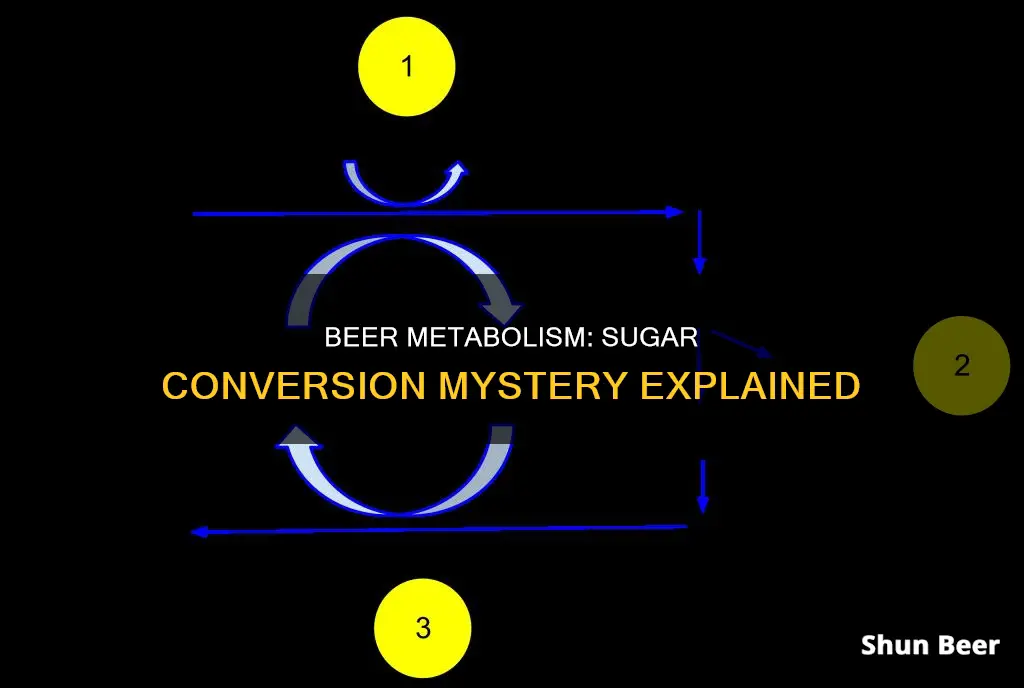
Beer and other alcoholic drinks are often blamed for weight gain and high blood sugar. However, this is a common misconception. Alcohol does not metabolize into sugar; instead, it is converted into several intermediate substances until it is broken down into carbon dioxide and water. As the body prioritizes the detoxification of alcohol over other nutrients, drinking alcohol causes blood sugar to drop and blood fats to increase temporarily.
Does beer metabolize into sugar?
| Characteristics | Values |
|---|---|
| Does alcohol turn into sugar in the body? | No, this is a common myth. |
| How is alcohol metabolized? | Alcohol is converted to a number of intermediate substances (none of which is sugar), until it is eventually broken down to carbon dioxide and water. |
| What is the effect of alcohol on blood sugar? | Alcohol makes your blood sugar drop. |
| What is the effect of alcohol on weight gain? | Alcohol is stored as fat more quickly than excess calories from sugar, protein, or fat itself. |
What You'll Learn

Alcohol is not metabolised into sugar
Alcohol is converted into a number of intermediate substances, none of which is sugar, and is eventually broken down into carbon dioxide and water. The liver breaks down, on average, one standard drink per hour. If you consume more than this, the liver can't keep up, and you start to feel tipsy and then drunk.
When you drink alcohol, the liver will prioritise breaking it down before dealing with other nutrients, which is why drinking alcohol causes your blood sugar to drop and your blood fat to increase temporarily. This is because the liver considers alcohol a toxin and will work to process it before anything else.
Alcohol does not become sugar at any stage of being broken down. However, wine and beer do contain small amounts of sugar from the fermentation process of the raw ingredients used to make them. For example, wine is made with grapes, which contain fruit sugars. In addition, soft drinks mixed with liquors contain high levels of sugar and undesirable chemicals.
Beer contains some carbohydrates, like starch, which can be metabolised into sugar. However, ethanol itself does not turn into sugar.
Beer vs. Whiskey: Sugar Content Face-off
You may want to see also

Alcohol is quickly absorbed into the bloodstream
Alcohol is a unique substance in that it does not require digestion and can be absorbed directly from the stomach into the bloodstream. This is in contrast to food, which requires time for digestion. About 20% of alcohol is absorbed through the stomach, with the remaining 80% being absorbed through the small intestine. This process can occur extremely quickly, with alcohol reaching the brain in as little as one minute. The speed of absorption is influenced by various factors, including the concentration of the drink, whether it is consumed on an empty stomach, and individual metabolism rates.
The effects of alcohol can be felt within 10 minutes, and it takes between 30 minutes to two hours for a single serving of alcohol to be fully absorbed into the bloodstream. The body can metabolize approximately 0.25 ounces of alcohol per hour. However, it's important to note that the effects of alcohol vary by individual and by how much alcohol they consume in one sitting.
Once alcohol is absorbed into the bloodstream, it is carried to vital organs such as the brain, liver, and heart. Alcohol negatively affects the brain, impairing the ability to focus, think clearly, and make good judgments. The liver is responsible for metabolizing alcohol, and it does so by breaking it down into a number of intermediate substances until it is eventually converted into carbon dioxide and water. This process of detoxification is given high priority by the body, as alcohol is considered a toxin.
The rate at which alcohol is absorbed into the bloodstream can be influenced by the type of drink. Carbonated drinks, such as champagne or whiskey soda, enter the system faster and will generally have a more immediate effect. Additionally, drinks with higher alcohol content, such as port wine (20% alcohol), will raise the blood alcohol concentration (BAC) faster than drinks with lower alcohol content, such as beer.
Beer vs Crown Whiskey: Which Has Less Sugar?
You may want to see also

Alcohol is converted into carbon dioxide and water
Alcohol does not metabolize into sugar. While it is a common misconception that alcohol is converted into sugar by the liver, this is not true. Alcohol is converted into a number of intermediate substances, none of which is sugar. Eventually, it is broken down into carbon dioxide and water.
The liver prioritizes the detoxification of alcohol over other nutrients, which is why drinking alcohol causes a temporary drop in blood sugar and a rise in blood fats. This process can be slowed by consuming food before and while drinking alcohol.
The idea that alcohol turns into sugar may have persisted due to the quick intake of liquid calories when consuming alcohol. Additionally, distilled alcoholic beverages like vodka, gin, and rum do not contain any sugar or carbohydrates, but when mixed with sugary ingredients, the overall sugar content of the drink increases significantly. For example, a gin and tonic can contain up to 20 grams of carbohydrates, all from the added sugar. Similarly, wine and beer contain small amounts of carbohydrates, with a regular beer containing 12 grams per 12-ounce bottle.
While alcohol does not directly turn into sugar, it can contribute to weight gain through its high caloric content and by slowing down the breakdown of fat in the body. Alcohol has seven calories per gram, and its quick absorption means that it can rapidly provide a large number of calories. As the liver considers alcohol a toxin, it will prioritize detoxifying it before processing other nutrients, including fat. This delay in fat breakdown can lead to weight gain.
Recent scientific breakthroughs have also shown that carbon dioxide can be converted into ethanol through the use of a catalyst. This process, discovered by researchers at Argonne National Laboratory, involves the use of an electrified catalyst made from copper and carbon. With over 90% efficiency, this method has the potential to revolutionize the way we utilize carbon dioxide, turning it into a valuable energy source.
Beer and Sugar: The Sweet Truth About Beer
You may want to see also

Alcohol lowers blood sugar
Alcohol does not metabolize into sugar. However, drinking alcohol can cause low blood sugar (hypoglycemia).
When you drink alcohol, your liver needs to break it down. While your liver is processing alcohol, it stops releasing glucose. As a result, your blood sugar level can drop quickly, putting you at risk for low blood sugar. If you take insulin or certain types of diabetes medication, drinking can cause seriously low blood sugar. Drinking without eating food at the same time also increases this risk.
The risk for low blood sugar remains for hours after you take your last drink. The more drinks you have at one time, the higher your risk. This is why it is recommended that you only drink alcohol with food and always in moderation.
The liver is the body's detoxification center, breaking down toxins like alcohol so the kidneys can easily flush them away. However, the liver is not great at multitasking. When you drink without eating, your liver will choose to metabolize the alcohol over maintaining your blood glucose, which can lead to hypoglycemia.
Unlike other nutrients, alcohol can be absorbed directly from your stomach into your bloodstream, where it travels to your brain. This effect is accelerated when you drink on an empty stomach. Having food in your stomach, especially fats, slows the speed at which alcohol enters your bloodstream.
Dark Beer's Sweet Secret: Sugar Content Surprise
You may want to see also

Alcohol is stored as fat
The liver, which is responsible for processing alcohol, considers it a toxin. As a result, the liver will focus on detoxifying alcohol before processing anything else. This means that drinking alcohol slows down the burning of fat, which can lead to weight gain. The liver will continue to process alcohol before breaking down fat, protein, or carbohydrates. This is why alcohol is often associated with weight gain and why heavy drinking can contribute to increased abdominal fat over time.
Additionally, alcohol can affect the hormones that control appetite, hunger, and stress, leading to unhealthy food choices and increased calorie intake. Alcohol also has a high number of empty calories, providing little to no beneficial nutrients or minerals. This can further contribute to weight gain if not balanced with a healthy diet and exercise.
It's worth noting that light-to-moderate alcohol consumption does not directly cause weight gain. However, regular heavy drinking can lead to weight gain due to the body's prioritisation of alcohol metabolism and the associated hormonal and metabolic changes.
Beer and Blood Sugar: What's the Connection?
You may want to see also
Frequently asked questions
No, beer does not metabolize into sugar. Alcohol is converted to a number of intermediate substances (none of which is sugar), and is eventually broken down into carbon dioxide and water.
Alcohol is a completely different nutrient from carbohydrates, fat, and protein. While it provides energy (7 kcal/g), it does not perform any essential functions in the body.
Alcohol is quickly absorbed and reaches the brain in about a minute. It is then sent to the liver, where enzymes break it down. The liver considers alcohol a toxin, so it will prioritize detoxifying it over other nutrients.
Alcohol causes blood sugar levels to drop. Since the liver is busy processing alcohol, it delays dealing with other nutrients, which can lead to hunger and overconsumption of calories.







